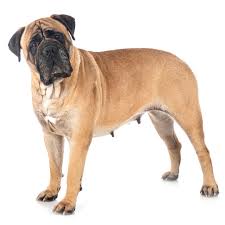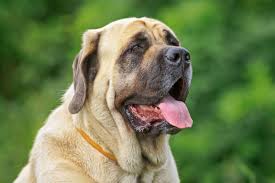Mastiff Dogs: Description and Complete Care Guide
The Mastiff is a magnificent breed of dog that boasts an imposing appearance and a gentle personality. Known for their immense size and strength, Mastiffs have been used throughout history as guardians, protectors, and even war dogs.
While Mastiffs can be traced back to ancient civilizations such as Egypt, Rome, and Greece, they have evolved over time to become the gentle giants we know and love today. One of the defining features of the Mastiff is their massive head, which can weigh up to 30 pounds alone.
Despite their size, Mastiffs are surprisingly gentle and affectionate with their owners. They are known for their loyalty and protective instincts, and will stop at nothing to keep their family safe.
Of course, owning a Mastiff comes with its challenges. For one, they require a lot of space – both indoors and out. A small apartment simply won’t cut it for these massive dogs. Additionally, Mastiffs can be prone to certain health issues, such as hip dysplasia and bloat, so it’s important to provide them with proper nutrition and regular exercise.
But for those who are up to the challenge, owning a Mastiff can be an incredibly rewarding experience. Their calm and loving demeanor makes them wonderful family pets, and their sheer size and presence make them excellent guard dogs.
If you’re considering adding a Mastiff to your family, be prepared for a lot of slobber, drool, and snoring. But trust us – it’s all worth it for the love and companionship these gentle giants provide.
The Mastiff is a breed that commands respect and admiration. From their massive heads to their loyal hearts, these dogs are truly one of a kind. So if you’re looking for a unique and unforgettable addition to your family, consider adopting a Mastiff – just make sure you have enough room on the couch for them to snuggle up next to you.
Read Also: Breeding Methods and Mode of Reproduction
History and Origin of the Mastiff Dog Breed

Throughout history, Mastiffs were prized for their strength and size, and were often given as gifts to rulers and nobility. They were particularly popular in England, where they were used as guardians of the royal estates and hunting companions.
During the Middle Ages, Mastiffs were used in warfare and were often outfitted with armor to protect them from enemy attacks. They were also used for bull and bear baiting, a cruel bloodsport that was popular at the time.
As the need for war dogs and hunting companions diminished, Mastiffs began to transition into their role as beloved family pets. In the 1800s, breeders began to focus on developing the breed’s gentle nature and temperament, and Mastiffs became known for their loyalty and affectionate personalities.
Today, Mastiffs remain a popular breed around the world, and are beloved for their gentle demeanor and imposing presence. They continue to be used as guard dogs and therapy dogs, and have even found success in dog shows and competitions.
Despite their storied past, Mastiffs remain humble and loyal companions, and are cherished by families around the world.
Health Issues and Lifespan of the Mastiff Dog Breed
Hip dysplasia: This is a genetic condition in which the hip joint doesn’t develop properly, leading to pain and mobility issues.
Bloat: Also known as gastric torsion, this is a life-threatening condition in which the stomach fills with gas and twists on itself, cutting off blood flow and causing the stomach to expand.
Heart disease: Mastiffs can be prone to a variety of heart conditions, including dilated cardiomyopathy and mitral valve disease.
Joint issues: Mastiffs’ large size can put a lot of stress on their joints, leading to conditions such as arthritis and osteochondrosis.
Cancer: Mastiffs have a higher incidence of cancer than many other breeds, particularly bone cancer.
It’s important to note that not all Mastiffs will develop these conditions, and that many can be managed or treated with proper care and veterinary attention. Regular check-ups and preventative care can help keep Mastiffs healthy and happy throughout their lives.
The lifespan of a Mastiff is typically around 6-10 years, which is relatively short compared to some other breeds. However, with proper care and attention, many Mastiffs are able to live happy and healthy lives well into their senior years.
Owners should be prepared to provide their Mastiffs with plenty of exercise and a healthy diet to help keep them in top shape. They should also be aware of the potential health issues associated with the breed, and be proactive about monitoring their dog’s health and seeking veterinary attention if any issues arise.
However, while Mastiffs may require a bit of extra care and attention, they make loyal and loving companions that are well worth the effort.
Complete Grooming and Care Guide of the Mastiff Dog Breed

Mastiffs are a large breed of dog that require regular grooming and care to keep them healthy and happy. Here is a complete guide to grooming and caring for your Mastiff:
Brushing: Mastiffs have a short, dense coat that sheds moderately throughout the year. Regular brushing with a soft-bristled brush can help remove loose hair and prevent matting. Aim to brush your Mastiff at least once a week, or more frequently during shedding season.
Bathing: Mastiffs only need to be bathed as needed, usually every 3-4 months. Use a gentle dog shampoo and rinse thoroughly to prevent skin irritation.
Nail trimming: Mastiffs have large, sturdy nails that can become overgrown if not trimmed regularly. Trim your dog’s nails every 4-6 weeks, or as needed to prevent them from getting too long.
Ear cleaning: Mastiffs can be prone to ear infections, so it’s important to clean their ears regularly. Use a gentle, dog-specific ear cleaner and cotton balls to clean the inside of their ears, being careful not to insert anything too deeply.
Dental care: Mastiffs are prone to dental issues, so regular dental care is important. Brush your dog’s teeth with a dog-specific toothpaste and toothbrush at least 2-3 times a week, and provide them with dental chews or toys to help keep their teeth clean.
Exercise: Mastiffs are a large and active breed that require plenty of exercise to stay healthy and happy. Aim to provide your Mastiff with at least 30-60 minutes of exercise daily, such as walks, hikes, or playtime in a secure yard.
Nutrition: Mastiffs require a high-quality, balanced diet that is appropriate for their size and activity level. Choose a dog food that is specifically formulated for large breeds, and monitor your dog’s weight to ensure they are getting the right amount of food.
Veterinary care: Regular veterinary check-ups and preventative care are essential for keeping your Mastiff healthy. Schedule annual wellness exams, vaccinations, and parasite prevention treatments, and seek veterinary attention if any health issues arise.
By following these tips for grooming and caring for your Mastiff, you can help ensure that your dog stays healthy and happy for years to come.
Read Also: Plant Breeding For Disease and Pest Resistance and Their Inheritance
Mastiff Puppies

Size: Mastiff puppies are born small, typically weighing between 1-2 pounds. However, they grow rapidly, reaching their full adult size within 18-24 months. Adult Mastiffs can weigh anywhere from 120-230 pounds, so be prepared for a big dog!
Temperament: Mastiff puppies are generally friendly, playful, and curious. They love to explore their surroundings, and are quick to make friends with people and other animals. As they grow older, Mastiffs become more calm and protective, making them excellent watchdogs.
Training: Mastiff puppies are intelligent and eager to please, making them relatively easy to train. However, due to their large size and protective nature, it’s important to start training early and use positive reinforcement techniques. Consistency, patience, and plenty of treats are key.
Socialization: Mastiff puppies need to be socialized early and often to ensure they become well-adjusted adults. Expose your puppy to a variety of people, animals, and situations, and provide them with positive experiences to help build their confidence.
Health: Mastiff puppies can be prone to certain health issues, such as hip dysplasia and bloat. Ensure that your puppy comes from a reputable breeder who has screened their breeding dogs for genetic health issues, and provide your puppy with proper nutrition, exercise, and veterinary care.
Grooming: Mastiff puppies have a short, dense coat that requires minimal grooming. However, regular brushing and occasional baths are still necessary to keep their coat healthy and clean.
Overall, Mastiff puppies are a joy to be around and make excellent companions for the right owner. With proper training, socialization, and care, your Mastiff puppy can grow up to be a loyal and loving member of your family for many years to come. Just be prepared to have a lot of drool and slobber around the house.
Neapolitan Mastiff

Here are some key features of the Neapolitan Mastiff:
Appearance: The Neapolitan Mastiff is a large and muscular dog, with a massive head and jowls, and a distinctive wrinkled face. Its coat is short and dense, and can be gray, black, or mahogany in color.
Temperament: Neapolitan Mastiffs are loyal and protective of their family, but can also be stubborn and independent. They require firm and consistent training to ensure they become well-behaved adults.
Exercise: Despite their large size, Neapolitan Mastiffs don’t require a lot of exercise. A daily walk or moderate playtime in a fenced yard is sufficient to keep them healthy and happy.
Health: Like other large breeds, Neapolitan Mastiffs can be prone to certain health issues, such as hip dysplasia and bloat. Regular veterinary check-ups and preventative care are essential for keeping your Neapolitan Mastiff healthy.
Grooming: Neapolitan Mastiffs have a short, dense coat that sheds moderately. Regular brushing can help remove loose hair and prevent matting, and occasional baths are necessary to keep their coat clean and healthy.
Training: Neapolitan Mastiffs are intelligent and eager to please, but can also be stubborn and independent. Positive reinforcement training techniques, such as rewards and praise, are most effective with this breed.
Overall, the Neapolitan Mastiff is a powerful and imposing breed that requires careful training and socialization to ensure it becomes a well-adjusted adult. With proper care and attention, a Neapolitan Mastiff can be a loyal and loving companion for many years to come.
Read Also: Concept and Principles of Water Quality









